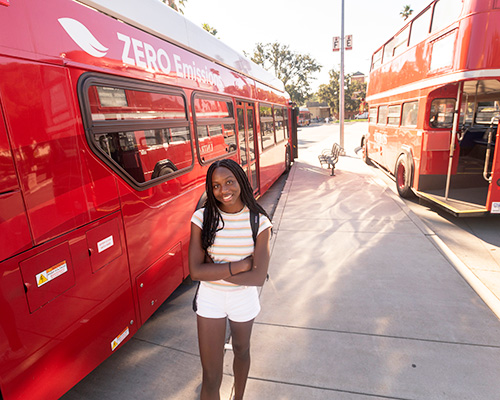On the first day of classes this quarter, Unitrans launched its first six zero-emission electric buses as a part of a long-term plan to progress towards UC Davis’ carbon neutrality goals. I decided to take a ride to see what they’re like.
When I first heard about these buses, I immediately wondered how they are different from the older ones. Perhaps they are more technologically advanced. Maybe they look different or even provide smoother rides.
So on the morning of Oct. 10, I took a ride on one of them for the first time. As I cruised along the K line, I noted significant differences between the old buses and the newer ones, making sure to acknowledge any similarities along the way.

Interior screens
Immediately upon entering the bus, I saw two mini-screens: One toward the front and another toward the back.
I got excited thinking that movies or other forms of entertainment were going to be played on them, but the screens actually cycle through reminders, job postings and other advertisements. I was slightly disappointed at first, but then I realized that I probably wouldn’t want my ears to be blasted by the sounds of some arbitrary TV show at 9 o’clock in the morning.
The mini-screens also showed stop requests when they were made. A voice audibly said “Stop Requested” to accompany the words on the screen, which is something that doesn't happen on the traditional buses.
Physical appearance
The electric buses hold the same number of passengers as the nonelectric single-decker ones, but I did notice two main differences in the interior.
The electric bus straps are made from a silicone-like material rather than the thick fabric used in the nonelectric ones.
The electric bus also has seats that are a lighter shade of red with thick, light-gray borders around them. In my opinion, these slight changes make the electric buses look modern and clean.
In terms of exterior differences, the electric buses are solid red and lack the horizontal white stripes that the nonelectric buses have.
Difference in ride quality?
I didn’t notice a huge difference in how the electric bus drove, and it felt the same as riding in a nonelectric one. In fact, when I rode a Unitrans bus on a later occasion, I didn’t even realize that it was electric until I looked up and saw its signature mini-screens.
A third-year student who I talked to during the ride expressed the same sentiments. “I have a bus driver friend who told me they were coming out with new [buses]. Even knowing that, the rides felt the same.”
Final thoughts
Essentially, if you don’t account for the electrical components and slight physical changes, the electric and nonelectric buses feel virtually the same for the rider. However, I know the environmental impact will be great.
Eight more electric buses are due to arrive in the spring quarters of 2023 and 2024, along with 14 charging stations funded by competitive grants. As the nonelectric buses reach retirement age, they’ll slowly be replaced by electric counterparts. Unitrans plans to complete its electric bus program by 2034.
